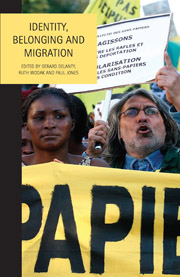Book contents
- Frontmatter
- Contents
- Acknowledgements
- List of Figures
- Notes on Contributors
- Introduction: Migration, Discrimination and Belonging in Europe
- I Theoretical Perspectives on Belonging
- 1 Belonging and European Identity
- 2 Identity, Belonging and Migration: Beyond Constructing ‘Others’
- 3 ‘Us’ and ‘Them’: Inclusion and Exclusion – Discrimination via Discourse
- 4 Dilemmas of Secularism: Europe, Religion and the Problem of Pluralism
- II Institutional Forms of Discrimination
- III Cases of Belonging and Exclusion
- Conclusion: Discrimination as a Modern European Legacy
- Index
1 - Belonging and European Identity
from I - Theoretical Perspectives on Belonging
- Frontmatter
- Contents
- Acknowledgements
- List of Figures
- Notes on Contributors
- Introduction: Migration, Discrimination and Belonging in Europe
- I Theoretical Perspectives on Belonging
- 1 Belonging and European Identity
- 2 Identity, Belonging and Migration: Beyond Constructing ‘Others’
- 3 ‘Us’ and ‘Them’: Inclusion and Exclusion – Discrimination via Discourse
- 4 Dilemmas of Secularism: Europe, Religion and the Problem of Pluralism
- II Institutional Forms of Discrimination
- III Cases of Belonging and Exclusion
- Conclusion: Discrimination as a Modern European Legacy
- Index
Summary
Some Points of Departure: The Concepts of Individual and Collective
Do human beings need belonging? Or is human self-realization basically an individual issue? The theoretical dimension of these questions has a bearing on questions of discursive power, symbolic representation and linguistic transformation. The question of how identities, solidarity and community are constructed under ‘we’/‘they’ demarcations is crucial. The key problem is also one of everyday mythology and the symbolic terms in which it is conceptualized. The use of a vocabulary of ‘construction’ and ‘invention’ in this context does not mean that ties of solidarity and community are created entirely independently, but rather that they emerge in a complex interaction marked by historical and cultural conditions. Interests and identifications are not decreed once and for all by specific material/socio-economic positions, but rather evolve in a confrontation with other interests and patterns of identification in processes of problem resolution and search for social compromises. Concepts such as interest and identity are not essential but discursive categories, and as such undergo continuous transformation through processes of social bargaining.
The ‘Hamlet Question’ – of belonging or not belonging – can be illustrated by the construction of ‘the New Man’ in two opposite versions (Stråth 2000c: 95–6). Visions of work were the foundation of the chiliastic ideas of the New Man in Soviet Russia. With socialism as a basis, the emergence of a new type of man was anticipated: solidaristic instead of egoistic, collective-minded instead of individually oriented.
- Type
- Chapter
- Information
- Identity, Belonging and Migration , pp. 21 - 37Publisher: Liverpool University PressPrint publication year: 2011
- 2
- Cited by



